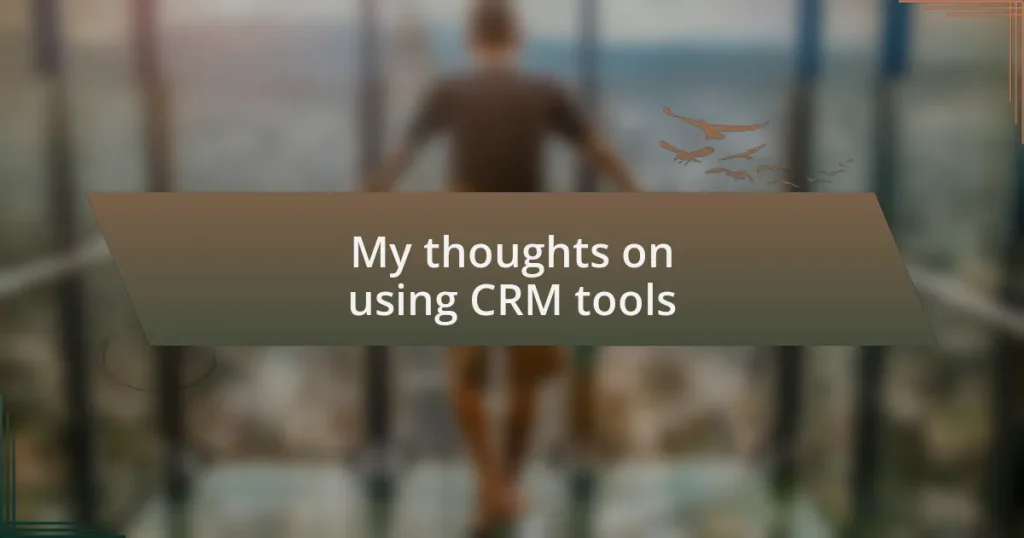Key takeaways:
- CRM tools centralize customer data, enhancing organization and communication for businesses.
- Key features include personalization, automation, and advanced reporting, which empower data-driven decision-making.
- Effective CRM usage improves client relationships by fostering personalized interactions and automating follow-ups.
- The emotional impact of CRM tools strengthens client loyalty through thoughtful engagement and attention to detail.
Understanding CRM Tools
When I first delved into the world of Customer Relationship Management (CRM) tools, I was astonished by their potential to transform business operations. These tools serve as centralized databases that allow businesses to manage interactions with clients, streamlining communication and organization. Just think about how chaotic customer data can get; a CRM tool turns that chaos into clarity.
As I navigated various CRM platforms, I realized each has its own unique features tailored to different business needs. For instance, some focus heavily on automation while others excel in user-friendly interfaces. Have you ever felt overwhelmed by analyzing customer interactions? That’s a moment when a well-chosen CRM can really ease the burden, allowing you to focus on building those important relationships.
I remember a time when a simple CRM tool helped me track client follow-ups effectively. It was eye-opening to see how a structured approach could lead to better engagement and, ultimately, more sales. This personal experience taught me that understanding how to utilize these tools isn’t just beneficial—it’s essential for staying competitive in today’s fast-paced market.
Key Features of CRM Tools
The key features of CRM tools that stand out to me often revolve around personalization and automation. For instance, I find the ability to tailor interactions based on customer history incredibly valuable. It’s like having a trusted friend who remembers your preferences—this can really enhance the customer experience and foster loyalty.
Another major feature is the reporting and analytics capabilities. When I first started using CRM tools, the insights these platforms provided were truly enlightening. I could easily track sales trends and customer behaviors, helping me make data-driven decisions that I once struggled to navigate. Isn’t it empowering to have such comprehensive data at your fingertips?
Moreover, integration with other applications can’t be overlooked. I remember integrating my CRM with email marketing tools, which revolutionized my outreach efforts. This seamless connection meant I could manage campaigns and customer interactions in one place, significantly elevating my efficiency. Who wouldn’t want to simplify their workflow while enhancing customer satisfaction?
How CRM Improves Client Relations
When I first started using a CRM, I noticed an immediate shift in my client interactions. The way the tool allowed me to track ongoing conversations made follow-ups seamless and personal. It felt like I was having meaningful discussions rather than just checking off tasks; who doesn’t appreciate being remembered in a busy world?
One aspect that truly stood out to me was the ability to segment clients based on their needs and preferences. I recall a particular instance where I tailored my communication for a group interested in web design trends. The feedback I received was overwhelming—clients felt valued and understood. Doesn’t it feel great to know that your efforts to personalize outreach can directly impact client relationships?
Moreover, the automation features served as a game changer for me. I remember automating reminders for client check-ins, which allowed me to stay connected without the constant pressure of remembering every detail. This balance between automation and personal touch was crucial; it enabled me to nurture relationships more effectively, ensuring that clients felt cared for even when I was busy with other projects. Isn’t it reassuring to know that technology can enhance, rather than replace, the human element in client relations?
My Personal Experience with CRM
There was a time when I juggled various client communications across different platforms, and it felt chaotic. The transition to a CRM was like finally finding the missing puzzle piece. I vividly remember the first major project where I used it; suddenly, I had all client details at my fingertips. Could I have imagined a more organized way to work?
I distinctly recall a late night when I was prepping for a client presentation. Thanks to the CRM, I could pull up relevant past interactions in a matter of seconds. That little boost of confidence I felt, knowing I could reference our previous discussions, made all the difference. It dawned on me—why hadn’t I adopted this tool sooner?
The emotional impact of using CRM tools has been profound for me. I’ve noticed that when clients feel recognized, their loyalty grows. One client even told me how they appreciated my attention to detail during our meetings, which I attributed to my CRM’s insights. It made me wonder: how much more can we elevate these relationships with thoughtful engagement?
